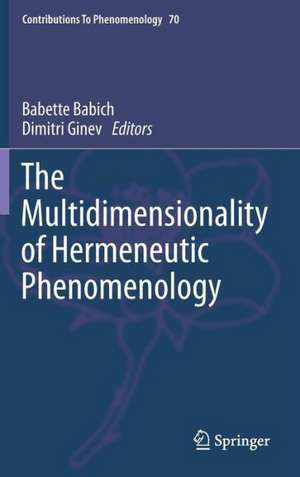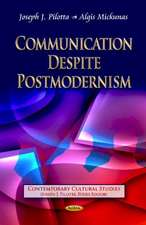The Multidimensionality of Hermeneutic Phenomenology: Contributions to Phenomenology, cartea 70
Editat de Babette Babich, Dimitri Gineven Limba Engleză Hardback – 28 ian 2014
Inspired by the many contributions made by the philosopher Joseph Kockelmans, this book examines the past, present and future prospects of hermeneutic phenomenology. It raises key questions of truth and method as well as highlights both continental and analytic traditions of philosophy.
Contributors to The Multidimensionality of Hermeneutic Phenomenology include leading scholars in the field as well as new voices representing analytic philosophers of science, hermeneutic and phenomenological philosophers of science, scholars of comparative literature, theorists of environmental studies, specialists in phenomenological ethics and experts in classical hermeneutics.
| Toate formatele și edițiile | Preț | Express |
|---|---|---|
| Paperback (1) | 647.27 lei 6-8 săpt. | |
| Springer International Publishing – 27 aug 2016 | 647.27 lei 6-8 săpt. | |
| Hardback (1) | 648.06 lei 6-8 săpt. | |
| Springer International Publishing – 28 ian 2014 | 648.06 lei 6-8 săpt. |
Din seria Contributions to Phenomenology
- 20%
 Preț: 630.92 lei
Preț: 630.92 lei - 20%
 Preț: 693.49 lei
Preț: 693.49 lei - 18%
 Preț: 984.42 lei
Preț: 984.42 lei - 18%
 Preț: 1230.03 lei
Preț: 1230.03 lei - 15%
 Preț: 645.79 lei
Preț: 645.79 lei - 15%
 Preț: 657.39 lei
Preț: 657.39 lei - 18%
 Preț: 728.28 lei
Preț: 728.28 lei - 15%
 Preț: 635.96 lei
Preț: 635.96 lei - 15%
 Preț: 578.87 lei
Preț: 578.87 lei - 15%
 Preț: 638.43 lei
Preț: 638.43 lei - 15%
 Preț: 691.59 lei
Preț: 691.59 lei - 20%
 Preț: 505.32 lei
Preț: 505.32 lei - 15%
 Preț: 645.28 lei
Preț: 645.28 lei - 15%
 Preț: 637.28 lei
Preț: 637.28 lei - 18%
 Preț: 951.91 lei
Preț: 951.91 lei - 15%
 Preț: 634.00 lei
Preț: 634.00 lei - 15%
 Preț: 646.75 lei
Preț: 646.75 lei - 18%
 Preț: 727.97 lei
Preț: 727.97 lei - 15%
 Preț: 693.71 lei
Preț: 693.71 lei - 18%
 Preț: 729.06 lei
Preț: 729.06 lei - 15%
 Preț: 692.56 lei
Preț: 692.56 lei - 18%
 Preț: 778.94 lei
Preț: 778.94 lei - 18%
 Preț: 780.68 lei
Preț: 780.68 lei - 15%
 Preț: 646.62 lei
Preț: 646.62 lei - 18%
 Preț: 1231.47 lei
Preț: 1231.47 lei - 18%
 Preț: 730.35 lei
Preț: 730.35 lei - 18%
 Preț: 784.61 lei
Preț: 784.61 lei -
 Preț: 358.79 lei
Preț: 358.79 lei
Preț: 648.06 lei
Preț vechi: 762.43 lei
-15% Nou
Puncte Express: 972
Preț estimativ în valută:
124.00€ • 129.47$ • 102.63£
124.00€ • 129.47$ • 102.63£
Carte tipărită la comandă
Livrare economică 04-18 aprilie
Preluare comenzi: 021 569.72.76
Specificații
ISBN-13: 9783319017068
ISBN-10: 3319017063
Pagini: 436
Ilustrații: XXXV, 398 p. 3 illus.
Dimensiuni: 155 x 235 x 30 mm
Greutate: 0.79 kg
Ediția:2014
Editura: Springer International Publishing
Colecția Springer
Seria Contributions to Phenomenology
Locul publicării:Cham, Switzerland
ISBN-10: 3319017063
Pagini: 436
Ilustrații: XXXV, 398 p. 3 illus.
Dimensiuni: 155 x 235 x 30 mm
Greutate: 0.79 kg
Ediția:2014
Editura: Springer International Publishing
Colecția Springer
Seria Contributions to Phenomenology
Locul publicării:Cham, Switzerland
Public țintă
ResearchCuprins
Foreword.- D. Ginev, The Universality of Hermeneutics in Joseph Kockelmans’s Version of Hermeneutic Phenomenology.- Introduction.- B. Babich, The Multidimensionality of Hermeneutic Phenomenology: Philology, Science, Technology, Theology.- PART I. Cognition, Bio-Hermeneutics, and Lifeworld.- N. Rescher, A Paradox of Cognition.- D. Ginev, The Articulation of a Scientific Domain from the Viewpoint of Hermeneutic Phenomenology: The Case of Vectorial Metabolism.- G. Schiemann, Husserl and Schütz: Reflections on Science and Life-World.- G. Leghissa, Phenomenology and the Humanities or Towards a Critical Genealogy of the Life-World.- R. Frodeman, Hermeneutics in the Field: The Philosophy of Geology.- R. Crease, The Metroscape: Phenomenology of Measurement.- PART II. Hermeneutic and Phenomenological Philosophy of Science and Technology.- P. Heelan, Consciousness, Quantum Physics, and Hermeneutical Phenomenology.- M. Stölzner, Die ewige Wiederkunft wissenschaftlich betrachtet. Oskar Beckers Nietzscheinterpretation im Kontext.- T. Kisiel, Heidegger and Our 21st Century Experience of Ge-Stell.- B. Babich, Constellating Technology: Heidegger’s Die Gefahr / The Danger.- L. Ma & J. V. Brakel, What Modern Science Is: ‘Technology’.- H. Schmid, Logos and the Essence of Technology.- PART III. Philosophical Truth, Hermeneutic Aesthetics, and History of Philosophy.- G. Nicholson, On the Manifold Meaning of Truth in Aristotle.- J. Malpas, The Twofold Character of Truth: Heidegger, Davidson, Tugendhat.- J. Faye, What can Philosophy of Science Learn from Hermeneutics–What Can Hermeneutics Learn From Philosophy of Science? With an Excursus on Botticelli.- E. Berti, The Classical Notion of Person and its Criticism by Modern Philosophy.- PART IV.Hermeneutic Science and First Philosophy, Theology and the Universe.- P. Kerszberg, Philosophie des sciences et philosophie première.- A. Peperzak, A Re-Reading ofHeidegger’s “Phenomenology and Theology”.- R. Gasché, The Remainders of Faith: On Karl Löwith’s Conception of Secularization.- S. Glynn, The Hermeneutics of God, the Universe, and Everything.- Contributors.- Index.
Notă biografică
Babette Babich was born in New York City. She is author of The Hallelujah Effect. Philosophical Reflections on Music and Technology from KD lang to Nietzsche (London 2012); La fin de la pensée. Sur la différence et la politique de la désunion entre philosophie analytique et philosophie continentale (Paris 2011); Nietzsches Wissenschaftsphilosophie (Oxford/Bern 2010); »Eines Gottes Glück, voller Macht und Liebe« (Weimar 2009); Words in Blood, Like Flowers: Philosophy and Poetry, Music and Eros (Albany 2006); Nietzsche e la scienza (Milan 1996); Nietzsche’s Philosophy of Science (Albany 1994). She is a three-time Fulbright fellow and has written numerous articles and book chapters and edited several book collections on continental philosophy of science, art, and critical theory in addition to serving, since 1996, as Executive Editor of New Nietzsche Studies.
Textul de pe ultima copertă
This book offers new reflections on the life world, from both phenomenological and hermeneutic perspectives. It presents a prism for a new philosophy of science and technology, especially including the social sciences but also the environment as well as questions of ethics and philosophical aesthetics in addition to exploring the themes of theology and religion.
Inspired by the many contributions made by the philosopher Joseph Kockelmans, this book examines the past, present, and future prospects of hermeneutic phenomenology. It raises key questions of truth and method as well as highlights both continental and analytic traditions of philosophy.
Contributors to The Multidimensionality of Hermeneutic Phenomenology include leading scholars in the field as well as new voices representing analytic philosophers of science, hermeneutic and phenomenological philosophers of science, scholars of comparative literature, theorists of environmental studies, specialists in phenomenological ethics, and experts in classical hermeneutics.
Inspired by the many contributions made by the philosopher Joseph Kockelmans, this book examines the past, present, and future prospects of hermeneutic phenomenology. It raises key questions of truth and method as well as highlights both continental and analytic traditions of philosophy.
Contributors to The Multidimensionality of Hermeneutic Phenomenology include leading scholars in the field as well as new voices representing analytic philosophers of science, hermeneutic and phenomenological philosophers of science, scholars of comparative literature, theorists of environmental studies, specialists in phenomenological ethics, and experts in classical hermeneutics.
Caracteristici
Discusses the resources of hermeneutics for understanding science, technology, faith and art Brings together in one volume the leading voices in Heideggerian hermeneutics of science and technology Offers new reflections on the life world, from both phenomenological and hermeneutic perspectives















